Established in 2012, The Unit of Play (UoP) is a transdisciplinary unit, based in the Department of Sociology at Goldsmiths, University of London. Its main activities are co-ordinating and developing a research focus within the Department through the hosting of conferences, reading groups, research projects, salons, seminars, workshops as well as supporting doctoral research. The research focus is oriented around the collaborative exploration and incubation of radically new ideas, practices, and proposals that cut across established disciplinary, theoretical, methodological, and thematic boundaries and concerns of the social sciences, arts and humanities.
Creatures of the Lines
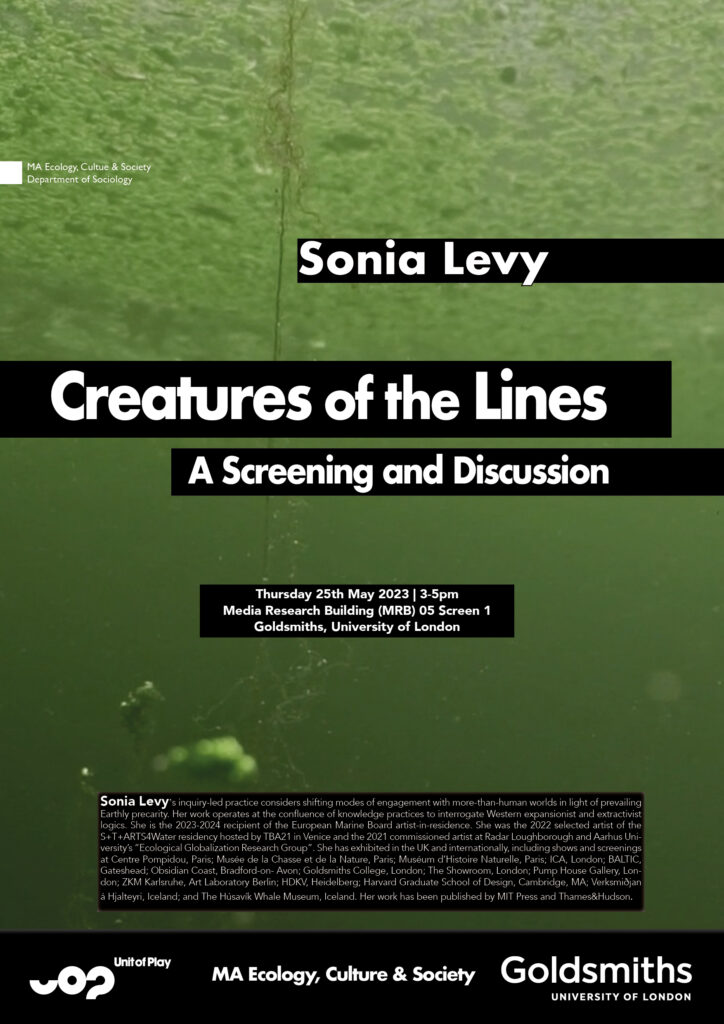
Creatures of the Lines, by Sonia Levy
Thursday 25th May 2023 | 3-5pm.
Media Research Building (MRB) 05 Screen 1
Goldsmiths, University of London
The MA Ecology, Culture & Society is delighted to invite you to a screening and discussion of Sonia Levy’s art film, “Creatures of the Lines,” developed in collaboration with the environmental anthropologist Heather Anne Swanson.
The film explores the transformation of English waterscapes via the construction of canals, investigating how desires for economic growth and linear progress have straightened forms in England’s watery terrains.
As arteries of the British Empire, canals linked Indian cotton fields to domestic textile mills, facilitating vast ecological transformations from monoculture agriculture in the colonies to industrial discharges in England’s waters, soils, and airs – and thus operate as critical sites for examining often-overlooked histories of colonial capitalism and their material presences in contemporary British worlds.
Attempting to work from within muddy and submerged perspectives rather than grand narratives or “god’s-eye” viewpoints, the film begins inside canals, telling stories from within the lines, raising questions about ecological transformations and their ties to the infrastructures of the global political economy.
Sonia Levy‘s inquiry-led practice considers shifting modes of engagement with more-than-human worlds in light of prevailing Earthly precarity. Her work operates at the confluence of knowledge practices to interrogate Western expansionist and extractivist logics. She is the 2023-2024 recipient of the European Marine Board artist-in-residence. She was the 2022 selected artist of the S+T+ARTS4Water residency hosted by TBA21 in Venice and the 2021 commissioned artist at Radar Loughborough and Aarhus University’s “Ecological Globalization Research Group”. She has exhibited in the UK and internationally, including shows and screenings at Centre Pompidou, Paris; Musée de la Chasse et de la Nature, Paris; Muséum d’Histoire Naturelle, Paris; ICA, London; BALTIC, Gateshead; Obsidian Coast, Bradford-on- Avon; Goldsmiths College, London; The Showroom, London; Pump House Gallery, London; ZKM Karlsruhe, Art Laboratory Berlin; HDKV, Heidelberg; Harvard Graduate School of Design, Cambridge, MA; Verksmiðjan á Hjalteyri, Iceland; and The Húsavík Whale Museum, Iceland. Her work has been published by MIT Press and Thames&Hudson.
Plot: On Black Spatial Insurgency
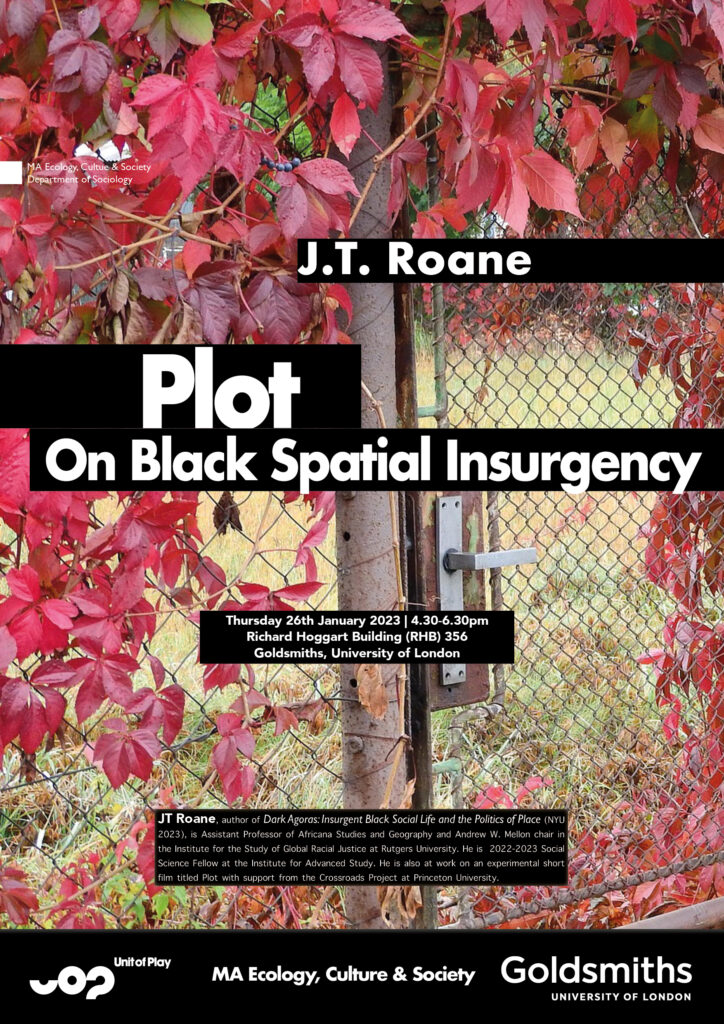
The MA Ecology, Culture & Society is delighted to invite you to a lecture by JT Roane (Rutgers).
Thursday 26th January 2023 | 4.30-6.30pm
Richard Hoggart Building (RHB) 356.
Goldsmiths, University of London
Free. All Welcome!
Plot: On Black Spatial Insurgency
In the context of slavery, various interrelated iterations of the plot—the site of the body’s interment, the garden parcel, a roving imaginary of the potential for connection in land and waterscapes outside of domination, and hidden insurrectionary activity—fostered a vision of de-commodified water and landscapes as well as resources among the enslaved. Evolving in dialectic with mastery and dominion especially as expressed in the social-spatial form of the plantation, enslaved and post-emancipation communities plotted a set of communal resources within the interstices of plantation ecologies, constituting the Black commons. The presentation examines the plot’s and the Black commons’ reorganization as living logics, as hybridized cultural praxes with capacity for incremental and radical transformation, translation, and translocation prompted by intracommunal dynamics and their expression in a dynamic relation with the forces that impinge upon Black placemaking from outside—extractionism, disposability, displacement, and death. Translated to the city in the context of the Great Migrations beginning at the turn of the twentieth century, this imaginary continued to underwrite a diverse array of visions for personal and collective urban social formations askew from the uneven terrain engendered by racial capitalism. In the rural context, the plot and the Black commons continued to evolve as a vision of an ecological otherwise, creating space of collectivity hedging the Jim Crow era enclosure. Finally, the plot served as the basis of radical thinker and writer June Jordan’s vision of terraforming “mississippi-america” through radical land reform and the abolition of property from the 1970s until her death in 2002.
JT Roane, author of Dark Agoras: Insurgent Black Social Life and the Politics of Place (NYU 2023), is Assistant Professor of Africana Studies and Geography and Andrew W. Mellon chair in the Institute for the Study of Global Racial Justice at Rutgers University. He is 2022-2023 Social Science Fellow at the Institute for Advanced Study. He is also at work on an experimental short film titled Plot with support from the Crossroads Project at Princeton University.
CoExtinction
UK Premier | Film Screening + Discussion
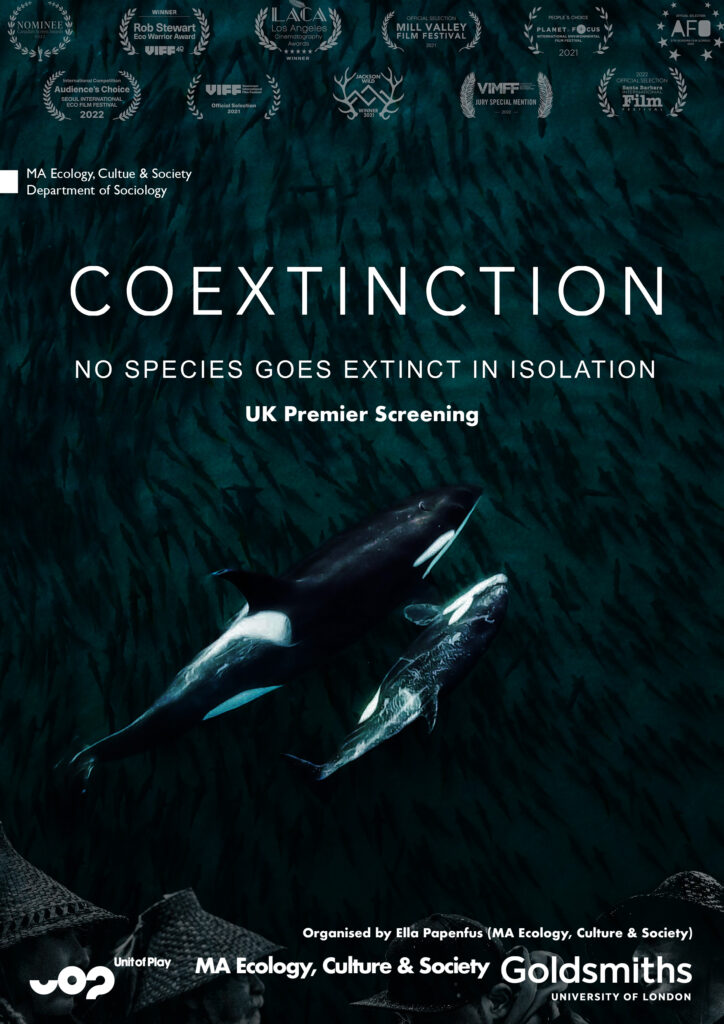
9th February 2023, 6-8.30pm
Cinema Room. Richard Hoggart Building.
Goldsmiths, University of London
Free. All Welcome.
Please register here. (Registration required due to limited capacity).
The MA Ecology, Culture & Society is delighted to invite you to the UK premier film screening and student-led discussion of COEXTINCTION, a documentary by Elena Jean and Gloria Pancrazi.
In an emotional action-packed journey, COEXTINCTION follows filmmakers Gloria Pancrazi and Elena Jean as they expose what it will take to save the last 73 Southern Resident orcas from extinction. Ultimately, their findings reveal how the orcas’ endangerment is fundamentally tied to the collapse of wild salmon populations and centuries of injustice against Indigenous peoples. It’s a story about coextinction.
COEXTINCTION unearths devastating faults in corrupt, oppressive systems at the root of the extinction crisis, follows a young orcas’ fight for survival, and reveals the true nature of our interconnectedness, where social and environmental justice intersect. It’s a global film with broad relevance, which amplifies Indigenous visions for change, and inspires bold action to save the orca and our collective future.
Elena Jean (Director, Producer, Executive Producer, Editor) is a Canadian documentary filmmaker based out of Tofino, within the traditional territory of the Tla-o-qui-aht First Nation. She has filmed endangered species around the world with world-renowned organizations like Sea Legacy and Milkywire. Her passion is to tell stories about hope, ingenuity, wild beauty, and to show the interconnected patterns of extinction.
Gloria Pancrazi (Director, Producer, Executive Producer) is a Canadian documentary filmmaker. She has worked on environmental and Indigenous justice documentaries like The Country and Impossible to Contain. After witnessing first-hand the impending extinction of the Southern Resident orcas, she decided to take the matter into her own hands and create Coextinction, a documentary that would educate and inspire people worldwide to take action.
This event has been organised by Ella Papenfus (student MA Ecology, Culture & Society) with the support of Martin Savransky (convenor MA Ecology, Culture & Society and Unit of Play director).
The Emergence of Composite Ethnography: Collaborative Methods for the Anthropocene
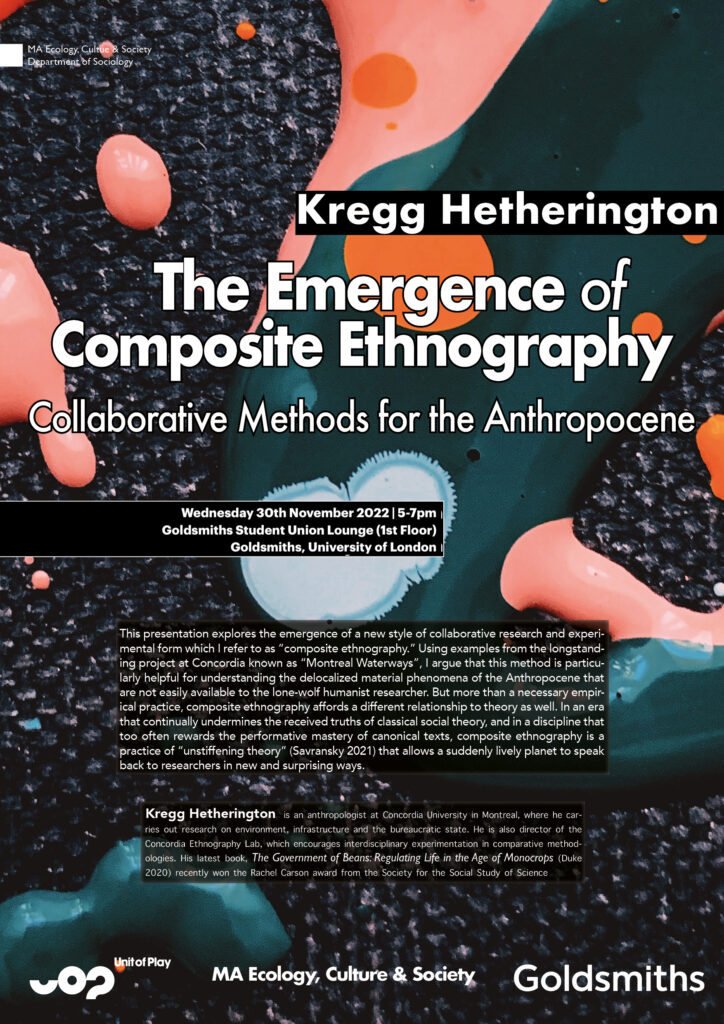
Kregg Hetherington (Concordia)
TEACH OUT!
Wednesday 30th Nov, 5-7pm | Goldsmiths Student Union Lounge (1st Floor) | Goldsmiths, University of London
All welcome! Registration required.
This presentation explores the emergence of a new style of collaborative research and experimental form which I refer to as “composite ethnography.” Using examples from the longstanding project at Concordia known as “Montreal Waterways”, I argue that this method is particularly helpful for understanding the delocalized material phenomena of the Anthropocene that are not easily available to the lone-wolf humanist researcher. But more than a necessary empirical practice, composite ethnography affords a different relationship to theory as well. In an era that continually undermines the received truths of classical social theory, and in a discipline that too often rewards the performative mastery of canonical texts, composite ethnography is a practice of “unstiffening theory” (Savransky 2021) that allows a suddenly lively planet to speak back to researchers in new and surprising ways.
Kregg Hetherington is an anthropologist at Concordia University in Montreal, where he carries out research on environment, infrastructure and the bureaucratic state. He is also director of the Concordia Ethnography Lab, which encourages interdisciplinary experimentation in comparative methodologies. His latest book, The Government of Beans: Regulating Life in the Age of Monocrops (Duke 2020) recently won the Rachel Carson award from the Society for the Social Study of Science.
Out Now! After Progress
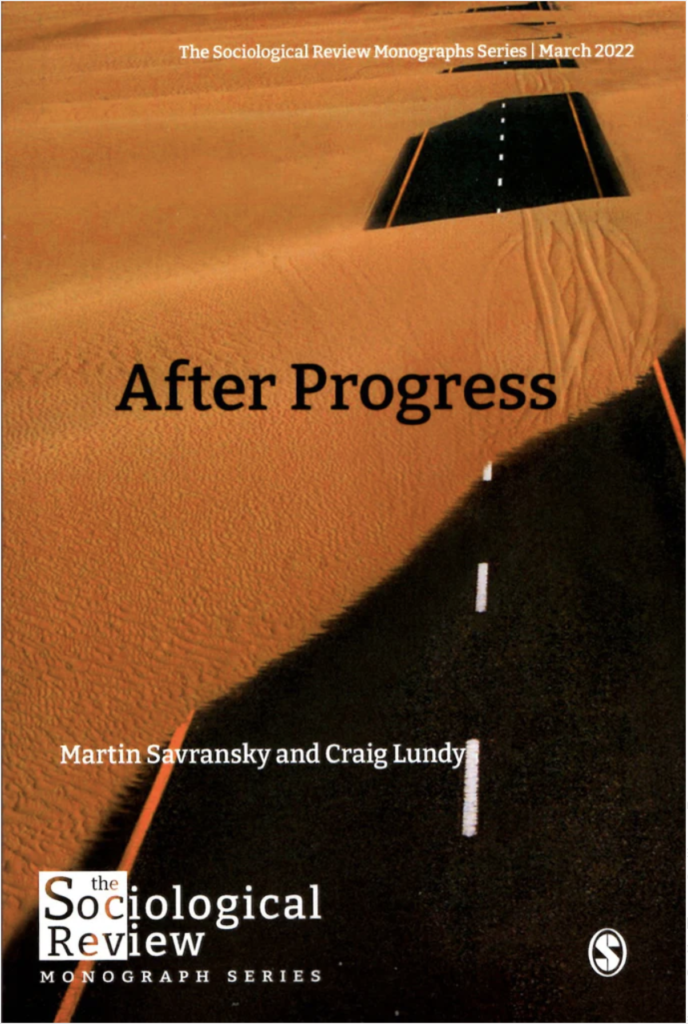
Available for purchase here.
Special issue available here.
After Progress, the latest Sociological Review Monograph, examines what it might take for us to learn to think and live after progress, “arguably the defining idea of modernity”, and one that the Monograph’s editors suggest that “we cannot live with but do not know how to live without”.
Published digitally today, with a print version forthcoming, the new monograph is Issue 70:2 in The Sociological Review Journal series. A broad-ranging collection of new scholarly writing helmed by guest editors Dr Martin Savransky (Goldsmiths, University of London) and Dr Craig Lundy (London Metropolitan University), its 12 chapters feature the insights of a global, cross-disciplinary cohort of 14 academics including sociologists, political theorists, anthropologists, and science and technology scholars.
In the introduction to After Progress, the editors examine the notion of progress and how it is framed by “civilisational imagery of a boundless, linear, and upwards trajectory towards a future that, guided by reason and technology, will be ‘better’ than the present”, and observe that progress’ “promises and discontents still command global political imaginations, values, and policies to this day”. The contributions in this collection, they note, aim to reframe progress “not as one modern value among others but as the very mode of evaluation from which modern values are derived”.
Dr Savransky and Dr Lundy recently launched a website, also titled After Progress, that presents work associated with the project that informed the monograph. The website is home to the After Progress Digital Exhibition, which its creators note is the “result of a multiplicity of collective efforts to weave together collaborative and multimedia forms of storytelling that might help us envisage ways of living and dying well outside of the modern coordinates of progress, drawing inspiration from the After Progress symposium series held in 2019.”
The After Progress monograph will have its official launch on 8 July 2022 as part of the London Conference of Critical Thought 2022, which will be held over two days at Birkbeck, University of London.
After Progress table of contents
- “After Progress: Experiments in the Revaluation of Values”, Martin Savransky and Craig Lundy
- “Knowledge, Progress, and the Knowledge of Progress”, Sanjay Seth
- “Governing Progress: from Cybernetic Homeostasis to Simondon’s Politics of Metastability”, Andrea Bardin and Marco Ferrari
- “Toward a Complex Conception of Progress”, Craig Lundy
- “Epidemiological Plots and the National Syndrome”, Lara Choksey
- “Waiting for Tindaya: Modern Ruins and Indigenous Futures in Fuerteventura”, Isaac Marrero-Guillamón
- “Tilting Relationalities: Exploring the World through Possible Futures of Agriculture”, Henrietta L. Moore and Juan Manuel Moreno
- “Implicated by Scale: Anthropochemicals and the Experience of Ecology”, Dimitris Papadopoulos
- “Re-animalising Wellbeing: Multispecies Justice After Development”, Krithika Srinivasan
- “Ecological Uncivilisation: Precarious World-Making After Progress”, Martin Savransky
- “Rifted Subjects, Fractured Earth: Progress as Learning to Live on a Self-Transforming Planet”, Nigel Clark and Bronislaw Szerszynski
- “An Ecology of Trust: Consenting to a Pluralist Universe”, Didier Debaise and Isabelle Stengers
Pure Thought in the Physical System: Rough Metaphysics and the Earth
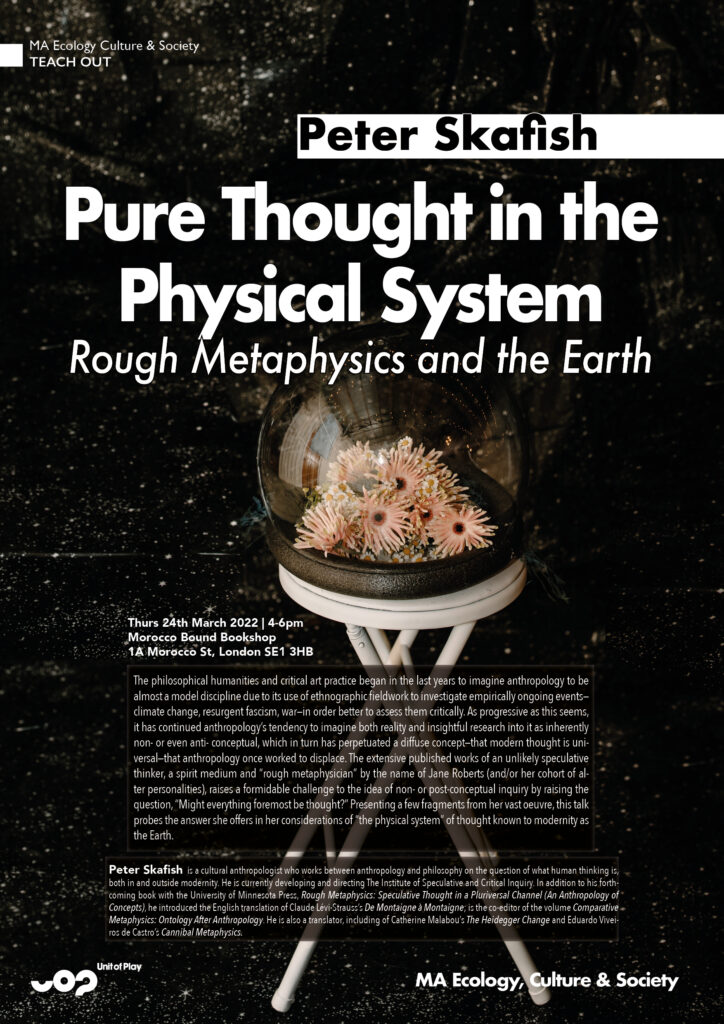
Pure Thought in the Physical System: Rough Metaphysics and the Earth
Peter Skafish (Institute of Speculative and Critical Inquiry)
24th March 2022, 4-6pm
TEACH OUT
Morocco Bound Bookshop
1A Morocco Street, London SE1 3HB
Free event. Registration required: here.
(NB– This will be an in-person only event).
The philosophical humanities and critical art practice began in the last years to imagine anthropology to be almost a model discipline due to its use of ethnographic fieldwork to investigate empirically ongoing events—climate change, resurgent fascism, war—in order better to assess them critically. As progressive as this seems, it has continued anthropology’s tendency to imagine both reality and insightful research into it as inherently non- or even anti- conceptual, which in turn has perpetuated a diffuse concept—that modern thought is universal—that anthropology once worked to displace. The extensive published works of an unlikely speculative thinker, a spirit medium and “rough metaphysician” by the name of Jane Roberts (and/or her cohort of alter personalities), raises a formidable challenge to the idea of non- or post-conceptual inquiry by raising the question, “Might everything foremost be thought?” Presenting a few fragments from her vast oeuvre, this talk probes the answer she offers in her considerations of “the physical system” of thought known to modernity as the Earth.
Peter Skafish is a cultural anthropologist who works between anthropology and philosophy on the question of what human thinking is, both in and outside modernity. He is currently developing and directing The Institute of Speculative and Critical Inquiry. In addition to his forthcoming book with the University of Minnesota Press, Rough Metaphysics: Speculative Thought in a Pluriversal Channel (An Anthropology of Concepts), he introduced the English translation of Claude Lévi-Strauss’s De Montaigne à Montaigne; is the co-editor of the volume Comparative Metaphysics: Ontology After Anthropology. He is also a translator, including of Catherine Malabou’s The Heidegger Change and Eduardo Viveiros de Castro’ Cannibal Metaphysics.
